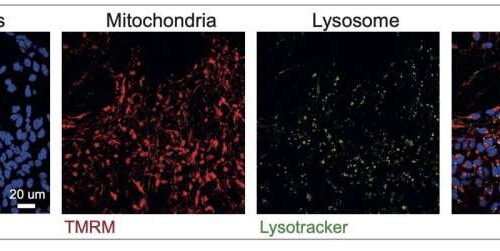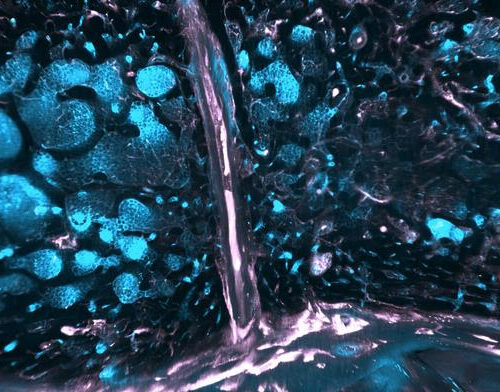by The Francis Crick Institute Image of nerve cells in the cortex of the brain which have been generated from patients’ stem cells (left) – the type of image the computer model used, split into panels showing different parts inside the cell (right). Credit: D’Sa, K. et al. Nature Machine Intelligence. (2023). Researchers at the Francis Crick...
Author: RMG
New orally available drug for spinal cord injury found to be safe and tolerable in healthy participants
by King’s College London KCL-286 transcriptional neuronal signaling. KCL-286 binds to a retinoic acid receptor (RAR)β2/retinoid x receptor (RXR) heterodimer located at a retinoic acid response element (RARE). This results in activation of transcriptional pathways required for axonal regeneration. Credit: British Journal of Clinical Pharmacology (2023). DOI: 10.1111/bcp.15854 New orally available drug for spinal cord injury found to...
Odds of clinically meaningful weight loss low in adults with overweight, obesity
by Lori Solomon Among adults with overweight or obesity, the annual probability of weight loss of 5 percent or more was achieved by only one in 10, according to a study published online Aug. 7 in JAMA Network Open. Lyudmyla Kompaniyets, Ph.D., from the U.S. Centers for Disease Control and Prevention in Atlanta, and colleagues assessed...
Bacteriophages to Diagnose and Treat Bladder Infections
AUGUST 8TH, 2023 CONN HASTINGS MEDICINE, PUBLIC HEALTH, UROLOGY Researchers at ETH Zurich have developed a bacteriophage system to identify and treat bacterial bladder infections. Bacteriophages are viruses that infect bacteria, but these microorganisms have fallen out of favor as a treatment method for infection since antibiotics came along. Well, antibiotics are looking increasingly shaky as bacteria...
Researchers identify protein that may help protect against osteoporosis
WILEY New research published in The FASEB Journal indicates that increasing the expression of a particular gene may help to prevent bone loss associated with postmenopausal osteoporosis. For the study, investigators examined which genes are involved in turning precursor cells called bone marrow–derived mesenchymal stem cells (BMSCs) into cells that play a crucial role in bone formation. The screen...
Tool predicts a patient’s risk of developing psoriatic arthritis
WILEY In research published in Arthritis & Rheumatology, investigators developed and validated a tool called PRESTO that identifies patients with psoriasis who face an elevated risk for developing psoriatic arthritis and may therefore benefit from preventive therapies. Among 635 patients with psoriasis followed in the University of Toronto psoriasis cohort, 51 and 71 developed psoriatic arthritis during 1-year...
Tau-PET : a window into the future of Alzheimer’s patients
UNIVERSITÉ DE GENÈVE IMAGE: TAU IMAGING WITH 18F-FLORTAUCIPIR PET IN ALZHEIMER’S DISEASE. THE FIGURE SHOWS A PROTOTYPICAL TAU ACCUMULATION PATTERN, OBTAINED BY COMPARING TAU LOAD OF PATIENTS WITH ALZHEIMER’S DISEASE VS HEALTHY CONTROLS. THE BLUE-TO-WHITE COLOR SCALE INDICATES MORE PRONOUNCED TAU LOADS, WITH PINK-WHITE AREAS REPRESENTING THOSE WITH THE HIGHEST ACCUMULATION. CREDIT: © UNIGE Alzheimer’s...
A new ally in fighting brain diseases: our very own skull
HELMHOLTZ MUNICH (HELMHOLTZ ZENTRUM MÜNCHEN DEUTSCHES FORSCHUNGSZENTRUM FÜR GESUNDHEIT UND UMWELT (GMBH)) IMAGE: THE IMAGE PROVIDES A CAPTIVATING VIEW OF THE INTRICACY AND INTERCONNECTEDNESS OF THE HUMAN SKULL. THROUGH THE USE OF ADVANCED TISSUE CLEARING TECHNIQUES AND IMAGING WITH A LIGHT SHEET FLUORESCENT MICROSCOPE, THE SAMPLE HAS BEEN LABELED TO HIGHLIGHT MYELOID IMMUNE CELLS (SHOWN...
Treatments for poxviruses – including those causing mpox and smallpox – may already exist in licensed drugs
UNIVERSITY OF CAMBRIDGE Scientists studying how poxviruses evade natural defences in human cells have identified a new approach to treatment that may be more durable than current treatments. This follows their discovery of how poxviruses exploit a cellular protein to evade the host cell defences, and thereby replicate and spread effectively. Existing drugs developed to...
Anti-bacterial virus (Phage PASA16) treated antibiotic resistant infections: 86.6% success rate
THE HEBREW UNIVERSITY OF JERUSALEM IMAGE: A TEM VISUALIZATION OF THE PHAGE PASA16 WITH P. AERUGINOSA PA14. CREDIT: RONEN HAZAN [Jerusalem, Israel] – A new international study conducted by the Israeli Phage Therapy Center (IPTC) led by Prof. Ran Nir-Paz at Hadassah Hebrew University Medical Center and Prof. Ronen Hazan of the Faculty of Dental...







